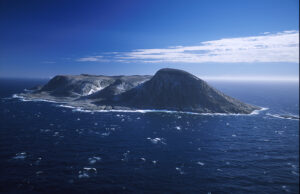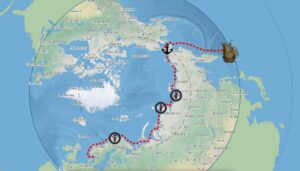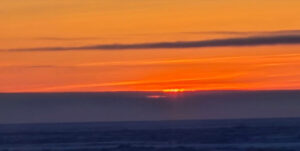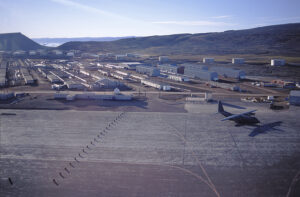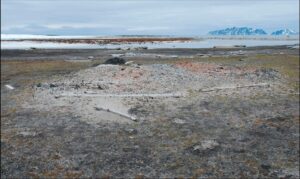On March 23, an international group known as the Transglobal Car Expedition lost a Ford F-150 truck through the ice 240 kilometres northwest of Taloyoak, in Canada’s Nunavut.
According to an Environmental and Natural Resources spill report, the modified truck was carrying 40 litres of fuel, a backup generator, and other noxious liquids when it foundered. The vehicle sank into the ocean in a key habitat and migration zone for numerous marine species.
Environmental concerns, outrage, and inaction
Now, the Spence Bay Hunters and Trappers Association and outside experts worry about the ecological and economic ramifications.
“We live off the land. We’re not farmers. We’re hunters and gatherers, and we need our game to be clean,” Jimmy Oleekatalik told the Canadian Broadcasting Corporation (CBC). “We want it cleaned out as quickly as possible.”
To aggravate matters, the Transglobal Car Expedition hasn’t made much effort to recover the F-150.
“They didn’t consult the locals, nor did they have adequate knowledge of the terrain/ice over which they drove. Most importantly, they don’t have a way to prevent contaminating the water or a way to quickly and effectively recover their trashed vehicle,” wrote West Hansen, an explorer whose kayak expedition will cross paths with the site this summer.
An Icelandic member of the expedition, Emil Grimsson, was put in charge of evaluating the situation. Grimsson told the CBC that his team located it eight metres from the surface. Its fuel tank appeared intact, he said, and the likelihood of fuel and antifreeze seepage was low — unless the truck was somehow damaged.
Grinding ice may damage vehicle
But that shallow depth is vulnerable to ice movement, especially during spring and summer. Moving ice may rupture the truck. Furthermore, eight metres is in the heart of the aquatic life zone.
Joe Ashevak is chair of the local Hunters and Trappers Association. “It’s going to harm the wildlife, one way or the other,” he says.
Grissom said the team will decide whether to recover the truck “by the end of May”. It will not attempt to retrieve it “until the ice is gone”.
An advisor to the Clean Arctic Alliance, Andrew Dumbrille, told the CBC: “Oils and lubricants and petrol and diesel…bioaccumulate in the environment, they don’t disappear, they don’t go away. They build up in fatty tissues in marine mammals or fish…and from there, it affects human health.”
An avoidable offense — and not the first
The incident occurred after the expedition had crossed over the sea ice from Yellowknife in the Northwest Territories to Resolute Bay, Nunavut. The Hunters and Trappers Association in Taloyoak insists that the catastrophe was avoidable, if only the expedition had asked for advice from locals familiar with the terrain and seasonal patterns.
Apparently, the expedition crew was surprised to find that the ice was only 15cm thick when the truck foundered.
“We could have at least advised them of areas where there’s fast water and open polynyas or places where it’s dangerous to travel,” said Ashevak.
Interestingly, the Transglobal Expedition’s ‘news’ page hasn’t been updated since March 25. The last post, “Towering sea ice and a lost Ford truck: Team treks from Yellowknife to Resolute Bay” does mention the F-150 loss, but only after a few hundred words celebrating the team’s successful “world first by trekking overland from the continental shelf to the High Arctic.”
Not the first controversy
Furthermore, the report follows its notably brief description of the incident with a statement that Nunavut locals likely take issue with.
“One of the team’s goals is to feed the Indigenous ice database siku.org with data its members collected during the trip, including information about thin-ice areas like those around the Tasmania Islands,” it states somewhat boldly. “‘We are hoping that on this trip, the ice data we are collecting will be helpful to communities,’ [expedition driver Andrew Comrie-Pickard] said.”
The expedition team had its first controversy following its inbound flight in early March. Reportedly, the team flew into Yellowknife aboard a Russian charter plane. This broke an airspace ban resulting from Russia’s February 24 invasion of Ukraine.
Both of the plane’s pilots, one Russian national passenger, and the Swiss aircraft operator were all penalized by Transport Canada for the violation. The aircraft operator, Dunard Engineering Ltd., was fined $15,000.

Four members of the expedition (left to right): Anton Ershov (Russia), Alexei Zeitsev (Ukraine), Brandon Langan, (Cambridge Bay, Nunavut), and Alexei Dubinin, (Russia), in Resolute. Photo: Transglobal Car Expedition
Possible penalties for the Transglobal Car Expedition
The Crown-Indigenous Relations and Northern Affairs Canada (CIRNAC) is overseeing the spill on an administrative level. The organization is not involved in the vehicle’s recovery. It’s there to enforce the law as provided by the Nunavut Waters and Nunavut Surface RightsTribunal Act. In that role, CIRNAC can also fine the expedition.
Unfortunately, the Transglobal Expedition did not require an assessment before it set off because it didn’t involve archaeological research, water use, or wildlife sampling.

